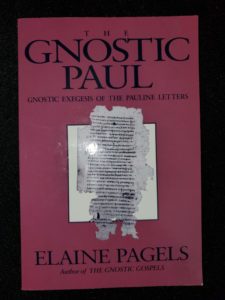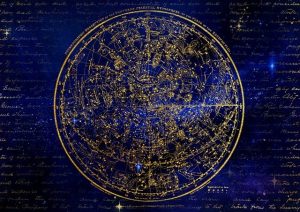This post is the second post in a series on the “Gnostic Paul”– that is, Paul perceived by certain Gnostic thinkers– on Galatians. For Part 1, click here. For Part 2, click here.
In this series of posts, we have been exploring the version of Paul presented by Elaine Pagels in her book The Gnostic Paul. Dr. Pagels reconstructs– using a combination of academic research and original texts– how “gnostic” thinkers (even though that word is loaded) may have perceived the apostle Paul. We’ll refer to this Paul as the “Gnostic Paul”, to indicate that this is not intended to be a discussion of historicity, but rather how certain early Christians perceived Paul. 
Specifically, we’ve been diving into Galatians. We’ve already covered, in Part 1, how the Gnostic Paul saw himself as a pneumatic- a distinct kind of Christian from the apostles– and the conflict this created when Peter (a “psychic” Christian) expected Paul to hold himself to standards that Peter wasn’t willing to be held to.
Part 2 dove into the specifics of the Gnostic Paul’s tirade. Paul argued that pneumatic Christians were justified through God but psychic Christians were justified through the Demiurge. This has really practical applications.
Here in Part 3, we’re going to pick up in Galatians 3 (and moving into Galatians 4), unpacking the next stage of his argument: Gnostic atonement theory, being an heir to God or to the Demiurge. Ready to dive in? Click below to continue reading!
Table of Contents
Atonement Theory of the Gnostic Paul
Galatians 3 records the Gnostic Paul writing:
Christ redeemed us from the curse of the law by becoming a curse for us—for it is written, “Cursed is everyone who hangs on a tree”— in order that in Christ Jesus the blessing of Abraham might come to the Gentiles, so that we might receive the promise of the Spirit through faith.
We covered this in Part 2, but let’s revisit it in more depth to discuss the Gnostic Paul’s atonement theory. In this reading, the curse of the law is materiality and suffering, which Christ entered into through the incarnation (thus “becoming a curse for us”). The passage notes that the Gentles (remember, for the Gnostic Paul, interpret “Gentiles” as “pneumatics” and “Jews” as “psychics”) receive the blessing of Abraham through Christ’s sacrifice.
There are a few interesting points here.
- First, the “blessing of Abraham”: do you remember from Part 2 that “Abraham” represents the Demiurge? The Demiurge itself is spiritual and not constrained by being made of matter; therefore, the Gnostic Paul is saying that Christ came to receive the same promise of the Spirit that the Demiurge has, but through faith.
- Second, who is Christ redeeming? Paul writes “us”, and the Gnostic Paul sees himself as a pneumatic; therefore, Christ is offering the promise of the Spirit to the pneumatics. Heracleon, Pagels reports, explains that the psychics already had limited access to God through the Demiurge, so Christ’s blessing went to the Gentiles instead.
- It is, thus, the responsibility of the pneumatic Christians to reveal the promise of the Spirit (and freedom from the Demiurge) to the psychics.
It is clear that, while some Gnostics saw the Demiurge as being evil, the Gnostic Paul (for the Valentinians like Heracleon) wasn’t. The Gnostic Paul explains this in Galatians 3:
Is the law then opposed to the promises of God? Certainly not! For if a law had been given that could make alive, then righteousness would indeed come through the law. But the scripture has imprisoned all things under the power of sin, so that what was promised through faith in Jesus Christ might be given to those who believe.
Think about that in the context of the previously cited passage. It reads: is the Demiurge opposed to the gift of the pneumatics? Certainly not! If the Demiurge could make people pneumatic, then he would have, but the Demiurge imprisoned all things through sin so that the pneumatic gifts of Christ might be given to those who believe.
 Note that I’m going to make a significant revision to the text:
Note that I’m going to make a significant revision to the text:
While the word the NRSV records as “offspring”, Heracleon read as “seed”. Heracleon believed, per Pagels, that this referred to the “pneumatic seed”, which was sown and raised through the mediation of the Demiurge’s angels. So, I’m going to replace “offspring” with “seed” so you read the text closer to how the Valentinians did.
You may wonder, then, why the Demiurge needed to happen at all; why did all things need to be imprisoned through sin if we were to receive the pneumatic gifts? Here’s what the Gnostic Paul says.
Now the promises were made to Abraham and to his seed; it does not say, “And to seeds,” as of many; but it says, “And to your seed,” that is, to one person, who is Christ.
My point is this: the law, which came four hundred thirty years later, does not annul a covenant previously ratified by God, so as to nullify the promise. For if the inheritance comes from the law, it no longer comes from the promise; but God granted it to Abraham through the promise.
Why then the law? It was added because of transgressions, until the seed would come to whom the promise had been made; and it was ordained through angels by a mediator. Now a mediator involves more than one party; but God is one.
There is a ton to unpack here, but let’s take a crack at a few things:
- The Gnostic Paul really emphasizes the singularity of God’s “seed” here. He makes it clear that the promise wasn’t made to a group of people (it doesn’t say “seeds”) here, but to one singular seed, which was his Christ (not the Jewish people / the psychics).
- The law was given because of “transgressions”– because humans are absolutely terrible people who do awful things to each other. The Demiurge was intended to impose morality and rules via sin until the promises of the Spirit were to be sent through Christ.
- Pagels notes that different Valentinians had different understandings of what “it was ordained through angels by a mediator” meant. Some thought it meant that the Demiurge was the mediator, and that the “seed was sown imperceptibly into Adam by Sophia”.
- We haven’t yet covered Sophia on the site and we don’t have the space to do it in this post, but for those who know what to look for, hopefully that helps your interpretation.
Heirs of the Atonement
Paul discusses two distinct types of heirs: the pneumatics who are elected to be “sons of God”, and the psychic Christians who may be adopted and become heirs to God, through God:
Pneumatic Heirs
The pneumatic type of heir shows up at the end of Galatians 3:
But now that faith has come, we are no longer subject to a disciplinarian, for in Christ Jesus you are all children of God through faith. As many of you as were baptized into Christ have clothed yourselves with Christ. There is no longer Jew or Greek, there is no longer slave or free, there is no longer male and female; for all of you are one in Christ Jesus.
 In the above, the Gnostic Paul makes it clear that he’s talking to the pneumatics, those ” no longer subject to a disciplinarian” (the Demiurge). Paul says pneumatics have “clothed [themselves] with Christ”; some Valentinians thought that the act of baptism essentially dyed us to, in some meaningful sense, be wearing Christ.
In the above, the Gnostic Paul makes it clear that he’s talking to the pneumatics, those ” no longer subject to a disciplinarian” (the Demiurge). Paul says pneumatics have “clothed [themselves] with Christ”; some Valentinians thought that the act of baptism essentially dyed us to, in some meaningful sense, be wearing Christ.
Therefore, your old identities– Jew or Greek, slave or free, male or female– no longer apply to you, for you are one in Christ Jesus.
Psychic Heirs
The psychic type of heir shows up at the beginning of Galatians 4:
But when the fullness of time had come, God sent his Son, born of a woman, born under the law, in order to redeem those who were under the law, so that we might receive adoption as children. And because you are children, God has sent the Spirit of his Son into our hearts, crying, “Abba! Father!” So you are no longer a slave but a child, and if a child then also an heir, through God.
Note Paul’s transition here from “we” to “you”; for the Gnostic Paul, he was talking about the pneumatics when using “we”, but talking to Peter (a psychic) when using “you”. In the above, Paul tells Peter the good news that Christ didn’t just come for the pneumatics; he came for the psychics, too.
Breaking Down the Barriers
While, for the Gnostic Paul, pneumatics are elected as heirs from the beginning and psychics must be adopted as heirs, the story is actually a bit less clear-cut than it might seem. Pagels notes Heracleon’s account that, for immature pneumatics, they really are in the same boat as the psychics, subjected to the cosmic powers until they become mature.
Even then, they’re still better off than the psychics, who weren’t just subjected to the cosmic powers; the psychics are understood to be actually enslaved by them.
Betrayal by the Psychic Heirs
Here, Paul is done explaining and begins issuing challenges:
Formerly, when you did not know God, you were enslaved to beings that by nature are not gods. Now, however, that you have come to know God, or rather to be known by God, how can you turn back again to the weak and beggarly elemental spirits? How can you want to be enslaved to them again? You are observing special days, and months, and seasons, and years. I am afraid that my work for you may have been wasted.
So, before the psychics like Peter were adopted by God, they were enslaved by the Demiurge and the “weak and beggarly elemental spirits”. Gnostic thinkers associated this with astrology and fate– as Pagels notes, this “involves observing stars, the planets– elements that gnostic exegetes interpret as the cosmic powers”. 
However, Paul observes that Peter and the psychics around them are getting back into observing the very bonds they’ve been broken from. In a sense, they were freed from the powers of fate and astrology, but are now going back to it.
Paul makes it incredibly clear that there are two kinds of heirs, two distinct covenants, in play:
Tell me, you who desire to be subject to the law, will you not listen to the law? For it is written that Abraham had two sons, one by a slave woman and the other by a free woman. One, the child of the slave, was born according to the flesh; the other, the child of the free woman, was born through the promise.
Now this is an allegory: these women are two covenants. One woman, in fact, is Hagar, from Mount Sinai, bearing children for slavery. Now Hagar is Mount Sinai in Arabia and corresponds to the present Jerusalem, for she is in slavery with her children. But the other woman corresponds to the Jerusalem above; she is free, and she is our mother.
If the psychics want to be subject to the law of the Demiurge, Paul reasons, let’s talk about what it actually says. Abraham (again, allegorically, the Demiurge) had two sons– one born in flesh, and one born through spirit/faith.
Paul notes that this whole thing is an allegory, and that Hagar represents the lower psychic realm, while the other woman represents “the Jerusalem above” and represents freedom and the pneumatics.
And yet, Paul notes good news! In a passage that some gnostic interpreted Sophia into:
For it is written,
“Rejoice, you childless one, you who bear no children,
burst into song and shout, you who endure no birth pangs;
for the children of the desolate woman are more numerous
than the children of the one who is married.”
The children of the desolate woman– Hagar, representing the psychics– are going to be regenerated through Christ in large numbers!
Freedom and Obligation
This does, of course, result in a difference of experience for pneumatic and psychic Christians. In the next post, as we finish Galatians 4 and move into Galatians 5, we’ll discuss freedom and slavery. Stay tuned!

1 thought on “What Were Gnostic Paul’s Daring Insights About Atonement?”